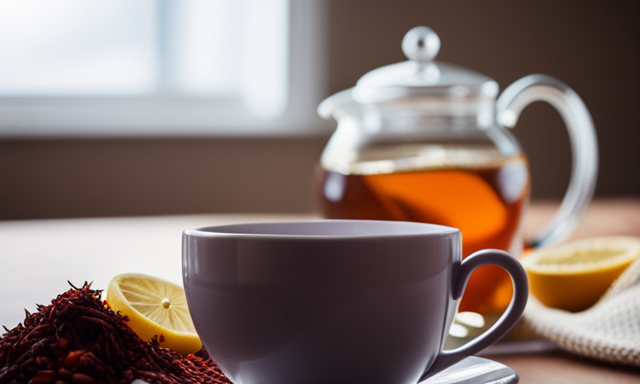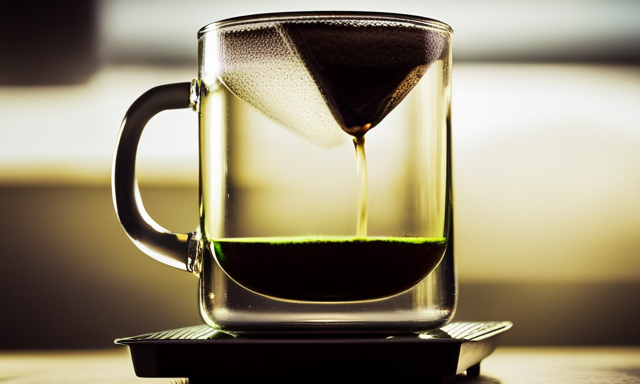Picture this: a warm cup of tea, soothing your senses after a long day. Now imagine that same cup of tea offering relief from the discomfort of histamine intolerance and allergies. That’s the power of rooibos tea.
Hi, I’m here to introduce you to the wonders of rooibos tea and its potential benefits for those dealing with histamine intolerance. In this article, we will explore what exactly rooibos tea is and how it can help alleviate symptoms associated with histamine intolerance.
We’ll delve into the science behind histamine intolerance and allergies, and discuss how rooibos tea can be incorporated into your daily routine.
We’ll also touch on any potential side effects and precautions to keep in mind.
So, if you’re ready to discover a natural way to find relief, let’s dive into the world of rooibos tea and its low histamine properties.
Key Takeaways
- Rooibos tea can reduce histamine levels and support a low-histamine diet.
- It provides a refreshing way to manage histamine intolerance and allergies.
- Rooibos tea is a natural option for reducing histamine levels.
- Incorporating it into a low-histamine diet can provide relief.
What is Rooibos Tea?
Rooibos tea is a delicious and caffeine-free alternative to traditional teas. It is a popular beverage that is native to South Africa and is made from the leaves of the Aspalathus linearis plant.
Understanding Rooibos tea production is key to appreciating its unique qualities. The leaves are harvested, fermented, and then dried in the sun, which gives the tea its distinct red color and rich flavor.
There are two main varieties of Rooibos tea: green and red. Green Rooibos tea is unfermented and has a milder taste, while red Rooibos tea is fermented and has a stronger flavor.
Now, let’s delve into understanding histamine intolerance and allergies, and how Rooibos tea can be beneficial for those with these conditions.
Understanding Histamine Intolerance and Allergies
Histamine intolerance refers to the inability of the body to properly break down and eliminate histamine, a compound involved in the body’s immune response. This condition can lead to a variety of symptoms such as headaches, hives, nasal congestion, and digestive issues.
Common allergies, such as pollen or pet dander allergies, can also cause similar symptoms as histamine intolerance, as they trigger the release of histamine in the body.
Causes and Symptoms of Histamine Intolerance
When you have histamine intolerance, you may experience a range of symptoms including headaches, hives, and digestive issues. Histamine intolerance occurs when your body is unable to properly break down histamine, a compound that is naturally produced in the body and found in certain foods. There are several causes of histamine intolerance, including enzyme deficiencies, gut health issues, and certain medications. Managing histamine intolerance symptoms involves avoiding foods that are high in histamine, such as aged cheeses, fermented foods, and alcohol. It is also important to be aware of other factors that can trigger histamine release in the body, such as stress and certain medications. Understanding the causes and symptoms of histamine intolerance can help you better manage your condition and improve your overall quality of life. Transitioning into the next section, common allergies and their effects…
Common Allergies and their Effects
If you’re someone who suffers from allergies, you know all too well the frustrating effects they can have on your daily life. Allergies can cause a range of symptoms, including sneezing, itching, watery eyes, and even difficulty breathing.
Common allergies include pollen, dust mites, pet dander, and certain foods. To prevent allergies, it’s important to identify and avoid triggers whenever possible. Keeping your home clean and free of allergens, using air purifiers, and washing your hands frequently can also help.
Managing allergies naturally can involve using remedies like saline nasal rinses, steam inhalation, and herbal supplements. One natural remedy that has been found to be beneficial for histamine intolerance is rooibos tea. It is known for its anti-inflammatory properties and can help reduce histamine levels in the body.
Transitioning into the benefits of rooibos tea, let’s explore how it can alleviate histamine intolerance.
The Benefits of Rooibos Tea for Histamine Intolerance
Sipping on a warm cup of rooibos tea can transport you to a cozy afternoon in a rustic African tea house. But did you know that rooibos tea can also provide relief for those with histamine intolerance?
Histamine intolerance occurs when the body has difficulty breaking down histamine, leading to symptoms such as headaches, skin rashes, and digestive issues. Rooibos tea is naturally low in histamine, making it a great choice for individuals with this condition.
Incorporating rooibos tea into your daily routine can help alleviate symptoms and promote overall well-being. Its anti-inflammatory properties and high antioxidant content can help reduce inflammation and support a healthy immune system.
So, why not enjoy a cup of rooibos tea and experience the benefits it can offer in alleviating symptoms?
Alleviating Symptoms with Rooibos Tea
Indulge in a warm, comforting cup of rooibos tea and feel your symptoms of histamine intolerance melt away like a soothing balm for your body. Rooibos tea is known for its potential to alleviate symptoms and provide health benefits for those with histamine intolerance. Here are four ways it can help:
-
Anti-inflammatory properties: Rooibos tea contains antioxidants that can reduce inflammation in the body, helping to relieve symptoms such as itching, hives, and congestion.
-
Calming effect: The tea has a calming effect on the body, which can help reduce stress and anxiety, both of which can exacerbate histamine intolerance symptoms.
-
Digestive support: Rooibos tea has been shown to soothe and support the digestive system, reducing symptoms like bloating, gas, and abdominal pain.
-
Hydration: Staying hydrated is important for managing histamine intolerance, and rooibos tea can be a delicious and hydrating option.
Incorporating rooibos tea into your daily routine can be a simple and effective way to manage histamine intolerance symptoms and support overall health.
Incorporating Rooibos Tea into Your Daily Routine
Experience the soothing embrace of incorporating rooibos tea into your daily routine and watch as your health and well-being flourish.
Start your morning off right by swapping out your usual cup of coffee with a warm mug of rooibos tea. Its low histamine properties make it an excellent choice for those with histamine intolerance or allergies.
Not only is it caffeine-free, but it also contains antioxidants that can help boost your immune system and fight off free radicals.
To add some variety to your routine, try experimenting with different rooibos tea recipes for a healthy lifestyle. Whether you prefer it hot or iced, there are endless possibilities to explore.
Discover the other health benefits of rooibos tea and how it can further enhance your well-being.
Other Health Benefits of Rooibos Tea
Rooibos tea has a plethora of health benefits that go beyond its low histamine content. One key benefit is its antioxidant properties, which can help to combat free radicals and reduce oxidative stress in the body.
Additionally, it has been shown to have a positive effect on blood sugar regulation, making it a potential aid for those with diabetes or at risk for developing the condition.
Lastly, Rooibos tea may also offer support for heart health, as it has been found to help lower blood pressure and reduce cholesterol levels.
Antioxidant Properties
With its impressive antioxidant properties, rooibos tea is a great choice for those looking to boost their overall health and well-being. Rooibos tea contains a variety of antioxidants, including aspalathin and nothofagin, which have been shown to have numerous health benefits.
These antioxidants help to protect the body against oxidative stress and damage caused by free radicals. By neutralizing these harmful molecules, rooibos tea can help to reduce the risk of chronic diseases, such as heart disease, cancer, and diabetes.
Additionally, the antioxidants in rooibos tea can support the immune system, helping to strengthen the body’s natural defense mechanisms. So, if you’re looking to support your immune system and reap the antioxidant benefits, incorporating rooibos tea into your daily routine is a great choice.
Moving on to blood sugar regulation…
Blood Sugar Regulation
Regularly consuming rooibos tea can improve blood sugar regulation, helping maintain stable energy levels and prevent spikes and crashes throughout the day. Here are four reasons why rooibos tea can help regulate blood sugar levels:
- Rooibos tea contains aspalathin, a unique antioxidant that lowers blood sugar levels.
- It has a low glycemic index, meaning it doesn’t cause a rapid increase in blood sugar levels.
- Rooibos tea enhances insulin secretion and sensitivity, improving blood sugar control.
- The polyphenols in rooibos tea reduce the risk of developing type 2 diabetes.
By incorporating rooibos tea into a daily routine, individuals can support blood sugar management and overall health. Moving on to the next section about heart health support…
Heart Health Support
To maintain a healthy heart, you can easily incorporate rooibos tea into your daily routine and experience the benefits of improved cardiovascular support. Heart health research has shown that rooibos tea may play a role in supporting heart health by helping to regulate cholesterol levels. Studies have indicated that rooibos tea can potentially lower LDL (bad) cholesterol while increasing HDL (good) cholesterol, leading to a healthier lipid profile.
To further illustrate the potential benefits of rooibos tea for heart health, the following table provides a visual representation of the research findings:
| Lower LDL Cholesterol | Increase HDL Cholesterol | |
|---|---|---|
| Study 1 | Yes | Yes |
| Study 2 | Yes | Yes |
| Study 3 | Yes | Yes |
| Study 4 | Yes | Yes |
Incorporating rooibos tea into your daily routine can be a simple and enjoyable way to support your heart health. However, it is important to consider potential side effects and precautions when consuming rooibos tea.
Potential Side Effects and Precautions
Although rooibos tea is generally considered safe, it’s important to be aware of potential side effects and precautions. It’s always a good idea to consult with a healthcare professional before making any significant changes to your diet or incorporating new beverages.
Here are three potential risks and long-term effects to consider:
-
Allergic reactions: Some individuals may be allergic to rooibos tea, experiencing symptoms such as itching, rash, or difficulty breathing. If you notice any adverse reactions after consuming rooibos tea, discontinue use and seek medical attention.
-
Hormonal effects: Rooibos tea contains phytoestrogens, which can mimic the effects of estrogen in the body. While this can be beneficial for some individuals, those with hormone-sensitive conditions or on hormone therapy should exercise caution and consult with their healthcare provider.
-
Oxalate content: Rooibos tea is naturally high in oxalates, which can contribute to the formation of kidney stones in susceptible individuals. If you have a history of kidney stones or are prone to them, it is advisable to moderate your rooibos tea consumption.
Considering these potential risks, it’s important to choose the right rooibos tea that suits your needs and preferences.
Choosing the Right Rooibos Tea
When it comes to choosing the right rooibos tea, there are a few key points to consider.
First, I always look for organic and sustainable options. This ensures that the tea is free from harmful pesticides and is produced in an environmentally-friendly manner.
Additionally, I pay attention to the flavor profiles and blends available. Different rooibos teas can have subtle variations in taste and aroma.
Lastly, I like to explore different blends that incorporate other herbs and spices. This can add an interesting twist to my cup of rooibos tea.
Organic and Sustainable Options
Choose an organic and sustainable option for your cup of rooibos tea and let the flavors bloom like a thriving garden.
When it comes to rooibos tea, organic farming practices are not only better for the environment but also for your health. By choosing organic rooibos tea, you are supporting farmers who utilize natural methods, avoiding the use of harmful pesticides and synthetic fertilizers. This ensures that the tea is free from harmful chemicals and retains its natural properties.
Additionally, organic farming has a lower environmental impact, promoting biodiversity and soil health. When you sip on a cup of organic rooibos tea, you can taste the purity and goodness of the earth.
Now, let’s dive into the fascinating world of flavor profiles and blends.
Flavor Profiles and Blends
When it comes to choosing a rooibos tea, flavor preferences can vary greatly from person to person. Some individuals enjoy a more robust and earthy flavor, while others prefer a sweeter and more floral taste. Luckily, there are a wide variety of flavor profiles and blends available to suit every palate.
Whether you’re looking for a traditional rooibos tea or a unique blend with added ingredients like vanilla or citrus, there is something for everyone. Additionally, brewing techniques can also impact the flavor of your tea. Experimenting with different steeping times and water temperatures can help you find the perfect balance of taste and aroma.
Now that we’ve explored the various flavor profiles and brewing techniques, let’s delve into frequently asked questions about rooibos tea and histamine intolerance.
Frequently Asked Questions about Rooibos Tea and Histamine Intolerance
Frequently asked questions about Rooibos tea and histamine intolerance:
- Can children and pregnant women safely consume Rooibos tea?
According to research, Rooibos tea is generally considered safe for both children and pregnant women, as it is naturally caffeine-free and contains no oxalic acid. However, it is always advisable to consult with a healthcare professional before introducing any new food or beverage into your diet, especially during pregnancy or for young children.
Can children drink Rooibos tea?
Can children drink rooibos tea?
Yes, children can safely enjoy the taste of rooibos tea. It is a great alternative to sugary drinks, as it is naturally sweet and caffeine-free. Rooibos tea is not only delicious but also offers numerous health benefits. It is rich in antioxidants, which can help strengthen the immune system and protect against diseases. Additionally, it is low in tannins, making it gentle on the stomach and suitable for children with sensitive digestive systems. However, it is always advisable to consult with your child’s pediatrician before introducing any new beverages into their diet.
Can pregnant women drink Rooibos tea?
Pregnant women can safely enjoy the delicious and healthful benefits of Rooibos tea during their pregnancy, supporting their well-being and nurturing their growing baby. Studies have shown that Rooibos tea is low in histamine, making it a safe choice for pregnant women who may have histamine intolerance or allergies. It is important to note that Rooibos tea does not contain caffeine, which is known to have negative effects on fetal development. Additionally, Rooibos tea is rich in antioxidants and minerals, such as calcium and magnesium, which are important for the development of the baby’s bones and teeth. However, as with any herbal tea, it is always recommended to consult with a healthcare professional before incorporating Rooibos tea into your pregnancy diet to ensure it is safe for you and your baby. In the next section, we will explore the benefits of Rooibos tea for histamine intolerance and allergies.
Conclusion: Exploring the Benefits of Rooibos Tea for Histamine Intolerance and Allergies
In conclusion, exploring the benefits of Rooibos tea for histamine intolerance and allergies reveals a tantalizing array of potential relief and soothing sensations.
When it comes to histamine intolerance, it is important to explore alternative remedies that can help alleviate symptoms. Rooibos tea is a natural option that has shown promise in reducing histamine levels in the body.
Additionally, understanding the role of diet in managing histamine intolerance is crucial. Rooibos tea can be a valuable addition to a low-histamine diet, as it is naturally low in histamine and can help support the body’s ability to break down histamine.
Incorporating Rooibos tea into your daily routine may provide a refreshing and beneficial way to manage histamine intolerance and allergies.
Frequently Asked Questions
Can rooibos tea be used as a substitute for antihistamine medications?
No, rooibos tea cannot replace antihistamine medications. While it may alleviate some allergy symptoms due to its antioxidant properties, it does not specifically target histamine release like antihistamines do.
Does rooibos tea have any potential interactions with other medications?
Rooibos tea may interact with antihistamines, potentially enhancing their effects. It is also known to have a beneficial effect on liver function, making it a safe option for those on medication.
How long does it take to see improvements in symptoms after incorporating rooibos tea into the diet?
I can’t specifically address the "improvement timeline" or "long-term effects" of incorporating rooibos tea into the diet. However, rooibos tea is generally known for its potential health benefits, including its antioxidant properties and potential anti-inflammatory effects.
Can rooibos tea worsen symptoms in individuals with severe histamine intolerance?
Rooibos tea does not cause allergic reactions or trigger histamine release in individuals with histamine intolerance. However, it is always important to listen to your body and consult with a healthcare professional.
Are there any specific brands or types of rooibos tea that are recommended for individuals with histamine intolerance?
Recommended brands of rooibos tea for individuals with histamine intolerance include Numi Organic Tea and Republic of Tea. Rooibos tea can provide numerous benefits such as antioxidant properties, anti-inflammatory effects, and potential relief from allergy symptoms.
Conclusion
What is Rooibos Tea Low Histamine?
Rooibos tea is a type of herbal tea that is naturally low in histamine. Histamine is a compound that is released by the immune system in response to allergens, and it is responsible for many allergy symptoms such as itching, sneezing, and congestion. For individuals with histamine intolerance or allergies, consuming foods and beverages that are high in histamine can trigger uncomfortable symptoms.
Rooibos tea, on the other hand, contains very low levels of histamine, making it a suitable option for those who are sensitive to this compound. By choosing rooibos tea, individuals with histamine intolerance can enjoy a hot or cold beverage without worrying about experiencing adverse reactions.
Not only is rooibos tea low in histamine, but it also offers a variety of potential health benefits. Some studies suggest that rooibos tea may have anti-inflammatory and antioxidant properties, which could help reduce inflammation and oxidative stress in the body. Additionally, rooibos tea is caffeine-free, making it a great alternative for those who are sensitive to caffeine or looking to reduce their intake.
Overall, rooibos tea is a flavorful and refreshing option for individuals with histamine intolerance or allergies. It provides a low histamine alternative to traditional teas and can be enjoyed as a part of a daily routine. However, it’s important to note that everyone’s tolerance to histamine can vary, so it’s always best to listen to your body and consult with a healthcare professional if you have any concerns or questions.










